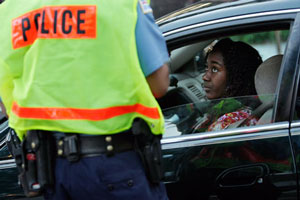
WASHINGTON (FinalCall.com) – While police checkpoints went back up in the Trinidad area of the city, community groups are eagerly seeking alternatives to help stem violence used to justify the law enforcement crackdown. Police Chief Cathy Lanier reinstituted the Neighborhood Safety Zones.
“Extending the checkpoints sends a clear message my officers will saturate the Trinidad neighborhood to keep the residents there safe and to ultimately find out those responsible for the violent crime in the area last weekend,” she explained, in a written statement. The safety zones were reinstated July 19.
“We will continue to canvass the neighborhood with fliers and offer residents every means possible to contact with any information about what they saw or heard in the early morning hours of July 19th,” said Chief Lanier.
The Neighborhood Safety Zones authorize D. C. police to set up checkpoints aimed at creating a safer neighborhood by increasing the police presence. The zones were reestablished after a weekend of violence–including seven people shot in five separate incidents–resulted in the death of 13-year-old Alonzo Robinson. It’s the second time this summer that the zones have been implemented in this community.
The police are not the only ones concerned about the crime and violence in the Trinidad neighborhood. The Peaceoholics, a community group dedicated to working with youth, organized a July 25 rally at the Phyllis Wheatley Elementary School in the heart of Trinidad.
“You can’t deal with crime without dealing with the social issues that cause crime. We deal with the social issues of that community. We empower the community to do for self. People expect the politicians and police to do it but the politicians and police work for the people,” Peaceoholics co-founder Ronald Moten told The Final Call.
“We get the community to understand that they have to take a stand and demand peace in their community. They have to demand the resources that they need. Trinidad’s been neglected for the past 10 years. We go to the guys on the corners and help them get jobs. We then work with them to help keep the peace,” Mr. Moten explained.
Also speaking at the rally was Muhammad Mosque 4 student minister Abdul Khadir Muhammad. “We’ve joined with Rev. Steve Young of the Holy Missionary Baptist Church to bring peace to the community,” said Mr. Muhammad. This coalition of Muslims and Christians is committed to peace, he said.
“We joined hands and prayed together and then walked through the community. We walked the dangerous streets and talked to the community. We talked to the youth. We’ve committed to going back there at least three times a week.
“The police chief invited us to come back. I’m going back consistently until we bring peace to that community,” Mr. Muhammad told The Final Call.
The Fruit of Islam, men in the Nation of Islam, have a history in D. C. of bringing peace to communities. Twenty-years ago they were called “Dopebusters” and closed open air drug markets in the Kenilworth Parkside and Mayfair Mansions housing complexes.
The police checkpoints got mixed reviews and a class action lawsuit was filed June 20 by the Partnership for Civil Justice, with the Washington D. C. -based public interest law firm seeking an injunction against Neighborhood Safety Zones.
The lawsuit asserts the roadblock program is an unconstitutional suspicion-less seizure of persons traveling on public roadways in D. C. The lawsuit also challenges the District’s use of mass civil rights violations to collect and aggregate data on the movement, activities and associations of law abiding residents and visitors to the District and wants the information expunged.
“It is very clear that the District of Columbia is engaged in an unprecedented and unconstitutional system of suspicion-less stops and seizures,” saidMara Verheyden-Hilliard, a Partnership for Civil Justice attorney. “This is unheard of and won’t stand judicial scrutiny,” she said.
Police said a spike in crime precipitated reintroduction of the security zones and checkpoints.
“Their own statistics show that there wasn’t a spike in violent crime. This program was a pretext. The police wanted to roll out a massive police operation. It’s very clear D. C. wants to continue the program,” Atty. Verheyden-Hilliard told The Final Call.
“The vast majority of residents are against it. They don’t want military style checkpoints,” she added.
Such sentiment drives home the importance of community groups in the anti-violence effort.
“We are organizing 100 community leaders and youth for a retreat in August. We want to come up with answers and solutions. We want to bring the stakeholders together. Our goal is to empower the people of that community to run their community. We want to empower the people to do for self and we provide the support and resources,” said Mr. Moten.











